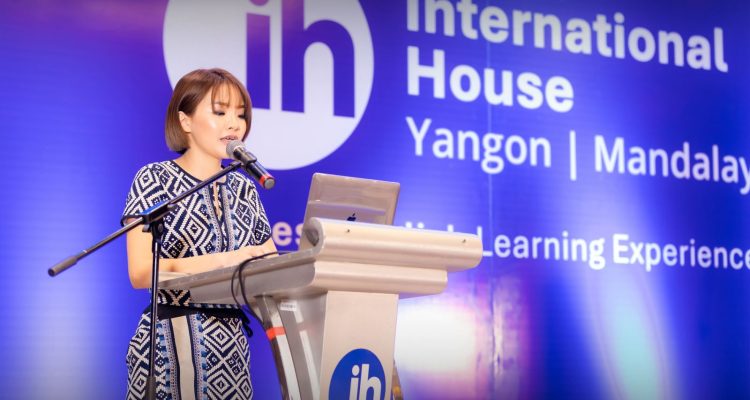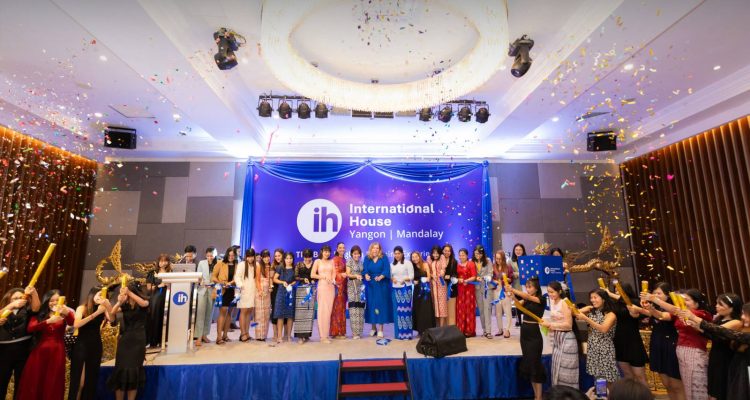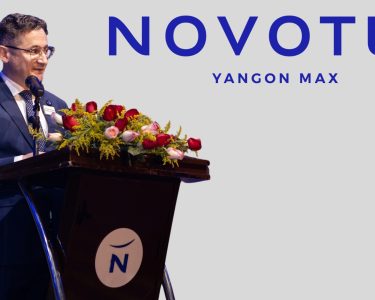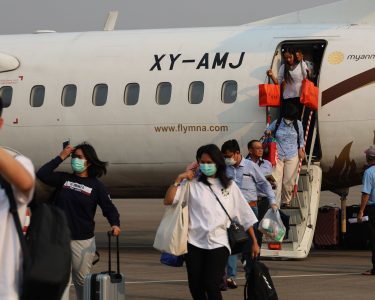Myanmar Investment Review
As Myanmar continues to navigate social and economic uncertainty, one institution is proving that quality education can be both accessible and impactful. In this edition of Leader Talks, Harrison White sat down with May Mon, Co-Founder of International House Yangon and Mandalay, to explore how she and her team built one of the country’s most respected English language schools—rooted in innovation, inclusivity, and international standards.
MIR: Can you share the origin story of International House Yangon—what inspired you to start the academy in 2017, and what motivated the expansion to Mandalay in 2023?
While working full-time, I had a strong interest in business management and entrepreneurial skills. Driven by my business acumen and willingness to take risks, I decided to start my own venture. At the time, Tharaphi was working as a freelance English teacher. Together, we shared a vision of opening a school that could offer high-quality English education rooted in practical, communicative learning.
Since we didn’t have much capital, we spent a year saving and carefully planning. In 2017, we founded a local school called SPACE Language Academy in a small apartment in Yangon. By reinvesting our income and staying focused on quality, we gradually expanded and became one of the leading language schools in Myanmar, with a student base of over 100,000 in 8 years.
When the COVID-19 pandemic hit in 2020, we quickly transitioned to interactive online classes via Zoom to ensure English learning remained accessible. At that time, most people were unfamiliar with online learning and many didn’t own laptops, so we optimized our lessons for mobile phones while maintaining a strong focus on communicative teaching.
In 2023, seeing a growing number of students joining our online classes from Mandalay, we opened a physical branch there. That same year, we applied to become an affiliate of International House World, aiming to validate that the quality of our education met global standards. In 2024, we proudly became the first International House school in Myanmar, operating as International House Yangon and Mandalay.
MIR: What have been the biggest challenges and successes in building an internationally recognized English language school in Myanmar’s unique educational landscape? How has the ongoing political / environmental / economical instability impacted your business?
Operating an educational institution in Myanmar presents a unique set of challenges. Over the years, we have navigated various external factors — including economic shifts, limited infrastructure, natural disasters and frequent disruptions — all of which have required us to be highly adaptable and innovative in how we deliver education.
One of the most significant challenges has been ensuring continuity in learning during times of disruption. Power outages, internet instability, and natural disasters have affected both our day-to-day operations and the learning experience of our students. Teacher recruitment and retention have also posed challenges, as the education sector continues to experience fluctuations in workforce availability.
In the face of these challenges, one of our greatest successes has been our ability to remain flexible and solution-oriented. During the pandemic, for instance, we quickly transitioned to online learning and redesigned our classes to be accessible via mobile devices, allowing students to continue their education wherever they were. We also established ongoing in-house teacher development programs to support our teaching team and maintain high standards across all classes. This commitment to innovation and quality led to our shortlisting as a finalist for Language Provider of the Year at the PIEoneer Awards in the UK.
Our continued focus on academic excellence was further validated in 2024, when we became the first school in Myanmar to join the International House World Organization — a global network known for its commitment to high-quality English language teaching.
Although challenges remain, we are proud to continue providing inclusive, learner-centered, and internationally benchmarked education that empowers individuals and strengthens communities.

MIR: How do International House Yangon and Mandalay differentiate themselves in terms of curriculum, teaching methodology, or international certification compared to other language centers in Myanmar / the region?
IH Yangon-Mandalay goes above and beyond industry standards in several impactful ways.
First, we follow the communicative language teaching approach, which emphasizes interactive, student-centered learning. Unlike traditional lecture-based methods, this approach helps students build confidence in speaking, communicate more naturally, and develop critical thinking skills. It prepares them for success beyond the classroom. While Myanmar students are often perceived as shy and reserved, our learners emerge as confident, expressive, and thoughtful communicators—thanks to our dynamic and innovative teaching practices.
Second, we embrace the philosophy: “Once our student, our student forever.” Even after completing a course, students remain part of our learning community. They continue to have access to monthly in-person training, free webinars, video lessons, and conversation clubs—all at no additional cost. This long-term support fosters a strong sense of belonging, and many students share that their experience at IH Yangon-Mandalay extends far beyond language learning.
Third, we are committed to making high-quality education accessible. We offer flexible payment plans and maintain diverse revenue streams—including corporate training and partnerships with various institutions—which allow us to keep fees affordable. We also provide scholarships for students in need, ensuring inclusivity without compromising on quality.
Fourth, as part of the global International House network, we have unique opportunities to collaborate with other IH schools worldwide. This allows us to initiate joint projects where students from different countries can participate and interact. We also invite international trainers and guest teachers from other IH schools, enriching our students’ learning experience and helping them feel connected to a truly global community.
Lastly, we believe in collaboration over competition. Through strategic partnerships with corporate organizations, our students and staff benefit from special discounts, while employees of those companies receive tailored English training. These mutually supportive relationships expand opportunities for our students and strengthen their ties to professional networks.
MIR: What trends are you observing in Myanmar’s education sector, especially in English language learning and professional training? Are student expectations or employer needs changing?
In recent years, Myanmar’s education landscape has undergone noticeable changes, particularly in English language learning and professional development. Several key trends are shaping the sector:
1. English as a Pathway to Study Abroad:
The primary motivation for learning English among Myanmar students continues to be the aspiration to study abroad. As a result, there is growing demand for academic English preparation and internationally recognized exams such as IELTS, TOEFL, and Duolingo English Test. Students are increasingly focused on mastering academic writing, reading skills, and test strategies to meet university admission requirements overseas.
2. Emphasis on Practical Communication Skills:
Alongside academic goals, many learners are seeking courses that prioritize real-world communication. There is a shift away from rote learning toward interactive, student-centered methods that help learners build confidence in speaking and develop critical thinking skills for success in global and multicultural environments.
3. Growth of Online and Blended Learning:
Digital learning platforms have become essential, especially following the COVID-19 pandemic. Students appreciate the flexibility of online and hybrid models, which have made English education more accessible, particularly for those outside major urban areas.
4. Rising Importance of Soft Skills in Professional Training:
Employers are looking beyond technical expertise and placing greater value on skills such as teamwork, communication, and adaptability. Professional training programs are responding by integrating these soft skills alongside English language development to better prepare students for the workplace.
5. Demand for International Certification and Recognition:
There is a clear trend toward pursuing globally recognized English language qualifications. These certifications serve not only as proof of proficiency but also as stepping stones to scholarships, international study, and global employment opportunities.
These trends reflect both changing student expectations and evolving employer needs. Education providers must remain adaptive, innovative, and globally aligned to support learners in achieving their academic and professional goals.

MIR: Looking ahead, what is your outlook for international-standard education and language training in Myanmar? Do you see opportunities for growth despite the current social and economic headwinds?
Despite the ongoing social and economic challenges, we remain optimistic about the future of international-standard education and language training in Myanmar. The demand for quality English education continues to grow, especially as more students aim to study abroad or pursue global career opportunities.
At the same time, we must acknowledge that Myanmar remains a price-sensitive market, particularly in the private education sector. To stay relevant and accessible, schools must design programs that balance quality with affordability. Creative pricing models, flexible payment options, and inclusive scholarship schemes will be key to sustaining enrollment and broadening access.
Another promising trend is the growing awareness among parents about international-standard education and the long-term benefits of early English language learning. As a result, programs for young learners are becoming increasingly attractive. Parents are actively seeking structured, high-quality English classes for their children, which opens new opportunities for growth in this segment.
Moreover, we believe that even during uncertain times, education can be a force for stability, empowerment, and hope. Students and teachers have shown remarkable adaptability in embracing digital tools and new learning formats. Strategic partnerships—with international institutions, corporate organizations, and local communities—will continue to strengthen the impact and reach of quality education.
In short, while the challenges are real, the opportunities are equally compelling. With resilience, innovation, and a strong focus on accessibility, international-standard education in Myanmar is well-positioned not just to endure, but to evolve and thrive.
To find out more about on May Mon and In House Yangon / Myanmar





